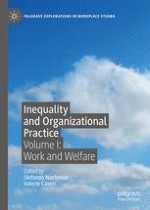2019 | OriginalPaper | Buchkapitel
8. Avoiding Hidden Inequalities in Challenging Times: Can Talent Management Help?
verfasst von : Muteb Alamri, Merlin Stone, Eleni Aravopoulou, Luisa Weinzierl, Guglielmo Calvini, Lakshmipriya Maheswaran
Erschienen in: Inequality and Organizational Practice
Verlag: Springer International Publishing
Aktivieren Sie unsere intelligente Suche, um passende Fachinhalte oder Patente zu finden.
Wählen Sie Textabschnitte aus um mit Künstlicher Intelligenz passenden Patente zu finden. powered by
Markieren Sie Textabschnitte, um KI-gestützt weitere passende Inhalte zu finden. powered by
